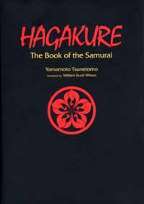No serious martial artists’ library is complete without a copy of Hagakure, they say, and the only translation to own is that of William Scott Wilson, one of the very best translators of seventeenth- and eighteenth-century warrior texts. The author, Yamamoto Tsunetomo, was a singularly unsuccessful samurai, serving Nabeshima Mistushige in minor positions and without much distinction. He never participated in a battle and the values he wrote of in his book were already antiquated in 1716 when it was first compiled. Despite all this, Hagakure is now considered to be one of the classic warrior treatises. Recorded by Tashiro Tsurumoto, it was almost certainly intended entirely for private use.
Wilson describes the text:
To speak of the Hagakure it is perhaps best to state first what it is not: that is, a well-thought-out philosophy, either in the sense of containing a closely reasoned or logical argument, or in terms of subject matter. On the contrary, it contains an antiintellectural or antischolastic bent throughout, and being a record of a seven-year-span of conversations, the subject matter varies considerably, ranging from the author’s deepest feelings concerning the Way of the Samurai to discussions on the implements of the Tea Ceremony or how a certain mansion acquired its name.
What it is, is a glimpse into the mind of an average, provincial samurai entirely dedicated to serving his lord, and as such it will be of interest to those who want to know more about the warrior culture of eighteenth-century Japan. It should not, however, be taken wholesale as a guide to the modern practitioner–there are some admonitions that simply will not do today: “The late Jin’emon said that it is better not to bring up daughters. They are a blemish to the family name and a shame to the parents. The eldest daughter is special, but it is better to disregard the others” (84). Who does this Jin’emon character think he is? I’d like to give him a piece of my mind, but since that isn’t likely in this lifetime, I think I’ll go work on my hikiotoshi uchi.
As you can tell, Hagakure is not my favorite, but it is significant and well-translated by William Scott Wilson, and a copy does belong on your shelf.

